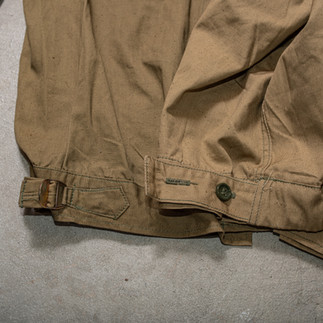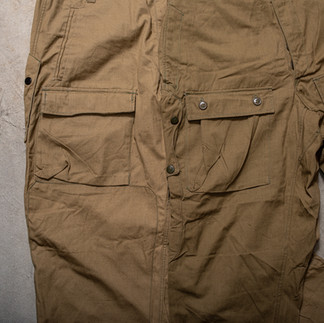Mabuta 1 and Mabuta 2: comparison of GRU Spetsnaz field uniforms
- Kyle Needham
- Apr 7, 2024
- 3 min read
Some time ago we have made a general article on Soviet Spetsnaz GRU uniform. It included all types of service wear - parade, everyday and field uniforms. In this article, which is provided by our new guest author, he is showing the exact differences between two suits. While the differences might seem very small in a grand scheme of things, they are important if you are trying to create an exact impression.

Brief history of first Mabuta - the classic GRU Spetsnaz uniform
As anything related to the Soviet Spetsnaz, its uniform is understudied due to lack of documents available to the public. From what we know, the Mabuta was adapted on 7th of August, 1969, by order of the USSR Ministry of Defense No. 0094. This document established the new overalls and shoes for Soviet special forces units. It was designed to be worn for parachute jumps, as well as for field use on training and combat missions. Strictly speaking, this is not a military uniform in its classical Soviet definition, but rather a set of special work robe.
Ever since, the uniform was heavily used by the GRU Spetsnaz, but it mostly became famous because of the Soviet-Afghan War. During the conflict, SPN units would wear this special cut clothing, unavailable for other units, which really made them to stand out. Because of that, it is now a rare and a praised piece for every collectioner who is into the conflict.

What's with the name - where did "Mabuta" come from?
Summer suit, colloquially called “jump suit” or “sand suit”. This set also has another nickname: “Mabuta”. According to one version, this name is due to the fact that the new clothes were similar in cut to the uniform of the army of the Democratic Republic of the Congo, whose president was Joseph Mobutu. And probably, Soviet military advisers, who saw the soldiers of Mobutu’s army wearing a uniform similar to a Soviet suit and dubbed him “Mabuta” after the African dictator. However, there are more than one possible origin of the word “Mabuta” and they are likely to be more correct. After all, Congo army was wearing camouflage at the time.

Comparison of two GRU Spetsnaz field uniforms - Mabuta-1 and Mabuta-2
I thought it would be fun to make a post comparing my 81' Mabuta-1 with my 82' Mabuta-2.
First thing to note is that they both use the same fabric type and they are both in stellar condition still with the factory tags. The Mabuta-2 is legitimately an overall upgrade on the first one. I'll list some key notes that differentiate the two.
Jacket:
Mabuta-1 uses pockets sewn on the outside and the button is external vs Mabuta-2 having a internal type of pocket with a button hidden under the flap
Waist band on the Mabuta-1 is also external and uses a buckle to sinch the strap tight. Mabuta-2's is internal and uses a button to set the strap placement.
Mabuta-2 has ventilation under the arms. Mabuta-1 lacks this feature.
Mabuta-2 has a pocket inside the jacket which uses a water proof polyurethane material. I assume this is to keep moisture (like sweat) away from documents. Mabuta-1 lacks this feature
Many other things are the same such as cuffs, sleeves and collar.
Pants:
The main pockets on the Mabuta-2 were moved somewhat closer toward the center of the pants
Mabuta-1 and 2 both have externally sewn pockets on the front but the former has exposed buttons.
Mabuta-2 has reinforcement on the knees where 1 does not.
Mabuta-1 has a strap on the knife pocket whereas 2 does not. I assume this feature was redundant since the snaps do an adequate job holding a knife.
There is ventilation on the Mabuta-2 pants. 1 lacks this feature.
The cuffs on the bottom of both of the pants are much different. Mabuta-1 is a simple button style whereas 2's is elastic.
2 lacks the tightening straps on the sides of the waist that 1 has
Mabuta-1 has 2 internally sewn pockets on the rear with exposed buttons. Mabuta-2 has one external and one internal both with hidden buttons. I'm not sure why this method was done but there must be a reason.
I don't notice any other differentiating details but if you notice some feel free to post them in the comments and I'll update it.














